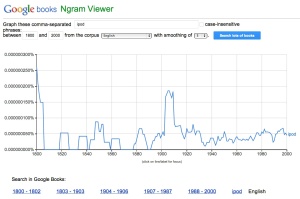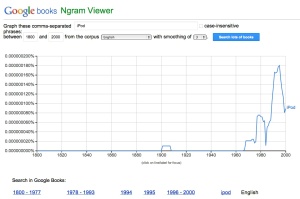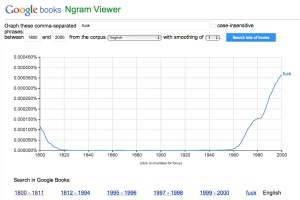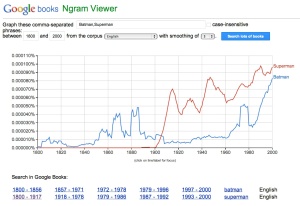Yesterday I spent a few hours on the phone with a similarly geeky friend, Fredrick, playing with NGram Viewer from Google. If you have never been on NGram Viewer, I have to warn you–make sure you have enough time!! We got sucked in quick, and we stayed a while.
NGram Viewer is a wonderful tool that allows you to enter one or more terms into a search box. Then, through the magic of Google (search, books, pictures, etc.), you receive a wonderful graph informing you of the popularity of whatever you have entered.
As we played with the tool, we were looking for ways to use it in the writing classroom to generate authentic research. For example, we put the word “ipod” into the Ngram viewer and got the following results:
Then, of course, we asked, “Why were people in 1800 and 1905 so crazy about ipods?” It’s easy to get the answer, of course. By clicking on the links at the bottom of the window, we easily accessed some of the texts that lead to the result. In this case, it seems to be a result of Google’s poor character recognition in the use of pre-digital scanned books. Anything that ends in “od” and has an indistinct first character will show as “ipod.”
The results from the 1970s and 1980s are very interesting, however. IPOD is used extensively during this period to refer to the “International Phase of Ocean Drilling,” and it is used repeatedly in treaties and technical manuals of the time.
We wondered why “ipod” wasn’t more popular in the late 1990s, and we got our answer when we introduced a capital “P” into the search:
It is plain that capitals are significant to this NGram Search . . . but what the heck was going on in 1906? Well, if you look closely, you will notice that “1906” resembles “iPod” . . . at least as far as Google’s somewhat dyslexic character recognition goes. Hmmm.
OK, so capitals matter. Interesting. What if we put in some swear words? For example, how popular is “fuck”? (Come on, don’t you want to know?). According to NGram, the writers in the 1800s had filthy pens:
On closer look, it appears that the Google character recognition system strikes again, interpreting “suck” and “such” as “fuck.” How disappointing! We were hoping to find some proof that my forefathers and foremothers also, occasionally, stubbed their toes and let loose with some appropriate epitaphs. It appears that the 1960s was the moment that our communal cursing got a bit out of hand.
OK, so where is all this leading? Well, for one thing, we had some serious fun just playing with words and testing the limitations of the NGram Viewer, as will students. However, we also got some great geeky ideas from it as well.
What if we were to assign a mini research paper–say two pages–that started with the search of a word or phrase the students might think of as completely modern like “WIFI” or “modem” or “xbox.” Then, when they get the results, ask them to write a hypothesis about why the word shows such popularity at unexpected times. Finally, we share the key to knowing why the results turn out that way (by clicking the links at the bottom), and then let them research the anomaly and report on it. (Heck we were interested, why wouldn’t they be?)
Another idea we had was to put in “this vs that” terms like “batman, superman.”
Some interesting results came about. For example, we wondered what the deal was with “Batman” being so popular all the way throughout time. It turned out that not only was there a famous guy named John Batman, an early explorer of Victoria, Canada, but “batman” was a common phrase for numbers of “bats” of cloth, such as silk.
And Superman? George Bernard Shaw wrote Man and Superman in 1903, insuring the term was well entrenched in popular culture long before the first Superman Comic book hit the newsstands in 1938.
Maybe the idea of the comparison/contrast essay could move to great new heights when our students have some context and history behind them . . . and who doesn’t want to see the man of steel trump that black clad billionaire in the satisfying results of an NGram search?
Perhaps the greatest aspect of using NGrams Viewer in the classroom is the excitement of finding something completely unexpected, completely unknown, and completely new by way of a term or comparison. Aren’t we all just a little tired of reading the same banal essays about nothing?
Let me know what you think about using NGrams in the classroom: Have you done it? What advice do you have for us?





Reblogged this on Dr. K's Blog.